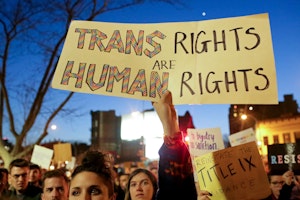Trans People Worldwide Face Huge Obstacles to Travel, Voting, Education, and Employment Due to Inaccurate Identity Documents
In order to change names and gender on legal documents many governments require psychiatric confinement and forced sterilization
NEW YORK—A groundbreaking guide on gender identity laws will help policymakers and trans advocates examine best practices from Argentina to Denmark to Nepal, said the Open Society Foundations today.
“All governments should recognize trans people for who they are,” said David Scamell, program officer with the Open Society Foundations. “Too many countries force trans people to jump through demoralizing, unnecessary, or even impossible hoops to legally change their gender.”
The new report, License to Be Yourself, documents some of the most progressive laws, policies and court decisions from around the world. From countries like Argentina and the United States that allow their citizens to change their gender identity without a medical diagnosis to laws in Portugal and New Zealand that do not require trans people to divorce their partner as a pre-condition of legal gender recognition.
“Trans groups are playing a central role in educating policymakers and our courts about best practices in transgender laws and policies,” said Scamell. “Laws should not get in the way of letting people be themselves.”
The minority of trans people around the world who can access legal gender recognition typically faces significant challenges. In all but a handful of countries, trans people must obtain a diagnosis of Gender Identity Disorder, or undergo gender reassignment surgery, which may sterilize them. Many trans people either cannot afford or do not want such procedures.
The report features case studies from Argentina, Australia, Hong Kong, Kenya, Ukraine, and the United States. For more information on Open Society’s work supporting trans rights visit www.osf.to/transrights.
###
The Open Society Foundations work to build vibrant and tolerant democracies whose governments are accountable to their citizens. Working with local communities in more than 100 countries, the Open Society Foundations support justice and human rights, freedom of expression, and access to public health and education.
Read more
Invisible No More
Q&A: Why Representation Is Crucial for Trans Rights

The first trans woman ever to appear on the cover of Elle Hungary speaks about justice, art, and her dreams for the next generation of trans people.
Voices
A Perilous Moment for Transgender People in the United States

In response to a series of increasingly brazen attacks against transgender Americans, civil society in the United States must stand strong for social justice and in defense of the progress made in recent years.
Voices
The Deep Roots of the U.S. Ban on Trans Soldiers

A proposal to exclude trans people from the U.S. military was greeted with widespread disapproval. But a new report reveals how often hatred of trans and gender-nonconforming people is not only tolerated, but encouraged.